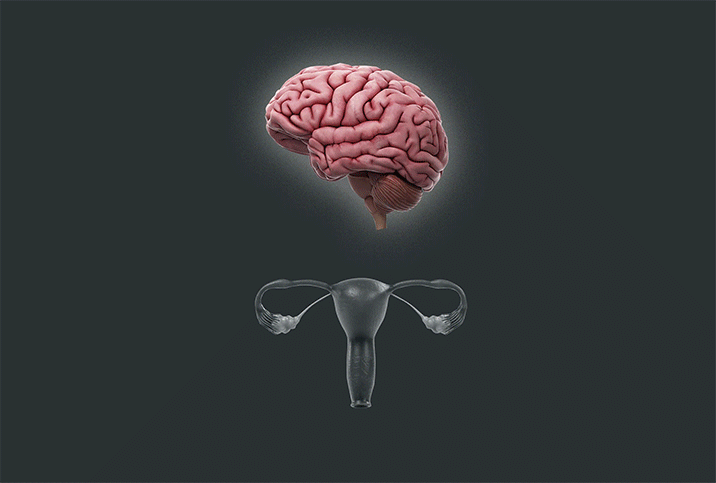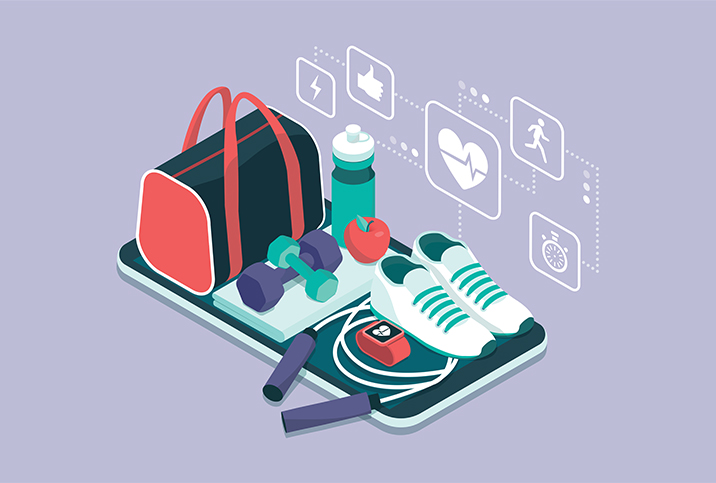Living Through and After Menopause

Menopause is a biological life stage brought about by hormonal changes during a woman's midlife when her ovaries stop producing hormones like progesterone and estrogen, and monthly periods cease. The average age of menopause—defined as 12 months after a person's last menstrual cycle—is 51 and can happen as early as 45 or much later, but the symptomatic process known as perimenopause begins four to eight years prior. Symptoms largely result from a huge chemical shift that occurs in the body. These hormonal changes cause a ripple effect that touches almost every part of a woman's life.
What's going on
Menopause comes with a slew of physical, mental and emotional symptoms that can make daily life difficult. The most recognizable is hot flashes, which transition into night sweats as a woman tries to sleep, contributing to difficulty sleeping through the night.
A lack of rest then worsens other menopause symptoms, such as mood swings and brain fog, which encompasses difficulty focusing and remembering things. In addition, the hormonal changes sparked by menopause can alter a woman's appearance, potentially contributing to weight gain, a redistribution of fat to the midsection and thinning hair. When all symptoms flare simultaneously, menopause can have serious effects on a woman's quality of life and self-esteem.
Many women find symptom-by-symptom treatment via lifestyle changes is an effective way to ease negative effects. For mental symptoms, women find success in a wide number of treatments, from engaging in brain-stimulating tasks like puzzles to learning new skills and practicing yoga or other exercise routines.
In order to get adequate rest, take extra steps to maintain sleep hygiene (no screens before bed, no naps, set sleep/wake times), limit caffeine intake, take over-the-counter or prescription insomnia medication (not recommended for chronic sleep issues) and establish a relaxing and consistent bedtime routine. Beyond those tips, consider some hot-flash-specific sleep recommendations, such as using fans, stashing a cool pack under your pillow, sleeping on sheets made of material that stays cooler and having multiple blankets you can peel on and off in layers instead of one big comforter.
However, sometimes even the best lifestyle choices and routines don't entirely eliminate symptoms, and aspects like depression and low self-esteem may require more work to manage. Seek professional help if low mood or mood swings persist, or to get additional support. Menopause is a tough time for any woman, and all can benefit from a trained counselor.
How long it will last
Unfortunately, menopause symptoms aren't exactly one-and-done. A majority of symptoms begin in the starting phase of menopause, known as perimenopause. Perimenopause can begin up to 10 years before your period actually stops and occurs when your body slowly starts making less estrogen, prompting the onset of symptoms. In the last couple of years of perimenopause, the decrease in estrogen becomes steeper. After you haven't had a period in 12 consecutive months, you will be considered postmenopausal.
Symptoms can potentially last as long as 10 years after the last menstrual period, though they typically decrease in frequency and intensity as time goes on. On average, you’re looking at about seven years of flaring symptoms. Studies have found that Black women tend to have symptoms for longer.
Living postmenopause
Some women find living without a period or the risk of pregnancy liberating. Even so, certain health conditions are more likely in women postmenopause, and should be paid close attention to.
Osteoporosis is a major concern for many postmenopausal women. With less estrogen in their bodies, bone density decreases, leaving women susceptible to fractures. To combat this, try to eat foods and supplements to increase levels of calcium and vitamin D in the body, as these nutrients help bones. Exercise is also beneficial, particularly strengthening and weight-bearing activity, which can be as simple as walking.
Menopause itself does not increase your chances of getting cancer, but there are a few factors to note. For instance, breast, uterine and ovarian cancer risk increases for the number of times you've ovulated, which is higher in women who started menstruating before age 12 and/or reached menopause after age 55.
To manage symptoms, some women may use hormone replacement therapy (HRT), a combination of estrogen and progestin (or estrogen alone if you've had a hysterectomy) that can provide tremendous relief from many menopausal symptoms. As with any treatment, it does come with risks, some quite serious, such as an increased risk of heart attack, stroke and breast cancer. By using the smallest effective dose for the shortest amount of time (generally less than five years), many women are able to take these medications safely. The risks may be too high in some women who have a personal or family history of certain cancers or health conditions. Every woman's risk, symptoms and personal preferences are different, so talk to your physician about what is right for you.
Though biological reproduction is impossible after menopause, it's important to keep up with your gynecological health. Continue to have regular pelvic exams and Pap tests, as well as other gynecological appointments as needed, plus mammograms. These will detect cancer early, which makes treatment easier.
Sex and menopause
During menopause, women experience a thinning of the vaginal tissue and a decrease in the production of natural lubricant, which can lead to pain or discomfort during intercourse, known as dyspareunia. It's a common symptom of menopause, with about 50 percent of women reporting some type of vaginal pain. The tissue is so thin and friable that sex is painful, and many women think they either have to put up with the pain or just never have sex again. But that's not the case. You do not have to choose between a sexless life and excruciating pain. We have a lot of tools at our disposal and successful treatment can be completely life-changing.
Talk to your healthcare provider about options to help lessen or end pain and improve your sex life. Low doses of vaginal estrogen creams, tablets and rings have been a mainstay of treatment for postmenopausal genitourinary symptoms and in relieving vaginal discomfort, but the Mayo Clinic recommends discussing the risks of vaginal estrogen therapy with your doctor if you've had breast cancer. Official recommendations are to try nonhormonal treatment modalities first, but vaginal estrogen therapy is not off the table. The low dose of estrogen used for the local treatment of postmenopausal vaginal atrophy has very little systemic absorption, an excellent safety profile and it works really well.
Besides estrogen, there are other prescription options for genitourinary symptoms in menopause, including selective estrogen receptor modulators (SERMs) that come in a pill you take orally, which some women prefer to vaginal routes, and vaginal DHEA (a hormone your body metabolizes to estrogen in only specific tissues). Just know there are prescription options for genitourinary symptoms besides estrogen.
Other options include over-the-counter vaginal moisturizers such as K-Y Liquibeads, which offer lubrication from the inside out. Replens Moisture Restore External Comfort Gel is a blend of moisturizers and vitamins that nourishes dry external vulvar skin with daily use.
Hyaluronic acid has been used in skincare products for years to address dry skin and reduce the appearance of fine lines and wrinkles. Now, it's the key ingredient in Revaree, a vaginal insert that reduces dryness. Vaginal lubricants can also enhance enjoyment and make intercourse less painful. They are toy-friendly, as well, and can be used during self-pleasure or to spice things up with your partner.
Advice for partners of menopausal women
If you're in a relationship with a menopausal woman, keep a few things in mind.
Don't be shy about doing your own research. There is a wealth of information about what to expect during perimenopause and menopause, and though it may differ from person to person, the information can help you prepare. If you do conduct your own inquiries, try not to give unsolicited sermons or directives on how she can take care of herself. The less you force your observations and interpretations onto your partner, the more likely she is to invite you into the discussion and seek your help.
Because the menopause experience is new, many women may not always feel capable of asking for things they want or need. Offering to help is a good way to ease her stress: If you perceive she's overwhelmed by information from her doctor, offer to join her during a visit. It could make the process easier for her to handle.
The important thing is to express your love and support through solicited or welcomed behaviors, rather than empty statements. Put your money where your mouth is: If you really do want to provide support, then follow up on the resulting requests or ideas. She may not ask twice.


















